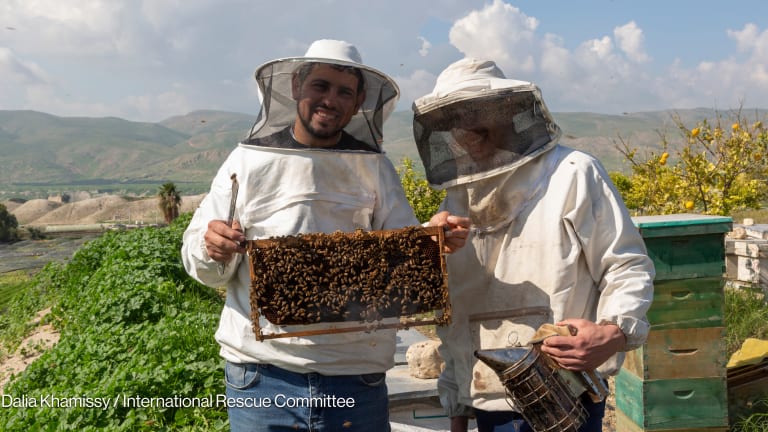
Back in 2013, an article in the U.K.’s Guardian newspaper castigated the development community for selling “resilience” to the public without a clear definition and using the term fleetingly. Four years on, many of the same questions remain. Is resilience still a mere buzzword that development organizations are using to rebrand their work? Have we moved past the jargon to taking meaningful action? Or rather, as I think of it, has resilience been with us since time-immemorial — a positive force that drives innovation, creativity, adaptation and technological evolution?
One thing is clear today: Resilience is here to stay. Over the past couple of years, the global community has rallied around the importance of building resilience. All the recent major conferences and agreements — from the Sustainable Development Goals, to the Sendai Framework on disaster risk reduction, to the 2015 Paris Climate Change Agreement, and the World Humanitarian Summit — reflect on resilience in some way or another.
Upcoming IEG event on building resilience
Please join us on April 20 for a panel discussion and live event on Building Resilience in the Face of Increasing Threats. Speakers include Dr. Keith Mitchell, prime minister of Grenada, and Robert Glasser, special representative of the U.N. Secretary General for Disaster Risk Reduction. Register here.
The reason why everyone’s attention is on resilience can be explained relatively easily: The increasing frequency and severity of shocks has shaken us up. A continuous stream of news — through mainstream and social media — about yet another disaster has galvanized the large majority of nations and leaders around the need to act. It has driven greater attention to research, analyses, debate, and above all, action.
Natural disasters alone affected on average around 200 million every year over the period 2004-2013; a number that dropped to 155 million in 2014 and 98.6 million in 2015 — a temporary relief, if one can call it that. But resilience encompasses more than a response to climate change. Add in conflicts and civil strife: Millions of people have been displaced for decades. The conflict in Syria has added millions more to the number of people fleeing their homes. Or, consider pandemics, such as Ebola and the Avian Flu, that have threatened humanity globally; financial crises that have destabilized economies; and social instability and terrorism that have taken their toll on our societies. Adding up the numbers of people affected goes well beyond the imaginable.

And, just as importantly, policymakers now increasingly recognize these shocks often have interdependencies that cut across the different dimensions — social, environmental, economic and financial. Environmental disasters do not matter alone because of their dramatic effect on lives and to the natural capital of nations. They have major social and economic consequences as well. Think of the Tohoku earthquake and tsunami of 2011: Not only were about 16,000 lives lost and much of the coastal area destroyed, the impact on the nuclear power plant has had long-term consequences. Or the 2008 crises, where we witnessed food and fuel price hikes that coincided with an unprecedented economic crisis that originated in the financial markets of North America.
Over the past decade, we have experienced more and more of these ripple effects that necessitate an understanding and ability to work on these challenges across boundaries. And here, I do not mean just across borders, but boundaries of sectors and technical expertise.
“The reason why everyone’s attention is on resilience can be explained relatively easily: The increasing frequency and severity of shocks has shaken us up.”
— Caroline Heider, director-general of Independent Evaluation GroupTherefore, we must ask ourselves: Will the multitude of resilience initiatives that we see across the development community lead to competition over resources, and fragmentation of solutions that worsen vulnerability rather than strengthen resilience? Given the greater and greater specialization of sectors and professions, are we able to find the necessary convergence of complementary initiatives that in combination will make us — humanity — more resilient?
There are ongoing efforts to add up the pieces. For instance, the Overseas Development Institute has done a great job in bringing together the threads of initiatives, from high-level meetings and commitments, through research, to social media in its platform on resilience.
Similarly, the Global Facility for Disaster Risk Reduction is a global partnership that is helping developing countries build their resilience against natural hazards and climate change.
On a much smaller scale, the Independent Evaluation Group has looked at a cross-section of evaluations covering the World Bank Group’s responses to crises and systemic shocks over the past decade. Each of these dealt with issues of resilience in different contexts, in an effort to provide feedback on policies and interventions, their effects, results and challenges. We will be discussing these insights with key stakeholders at the 2017 World Bank Group and IMF Spring Meetings.
Learn more about the World Bank Group’s experience in responding to crises and acute systemic shocks by reading IEG’s report here.








